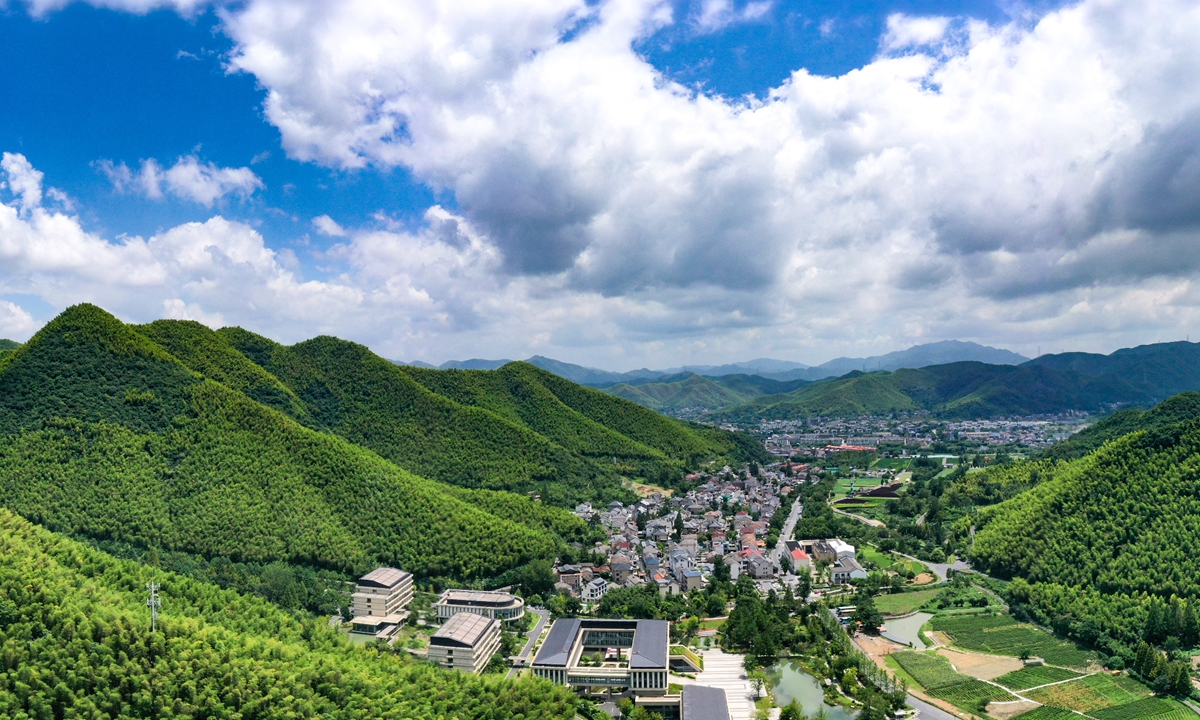
Yucun village in Anji,East China's Zhejiang Province Photo: IC
From selling stones to selling scenery, Yucun, a former small mining village in Anji county, East China's Zhejiang Province, has transformed from a polluting miner to an environmental steward.
The example of Yucun is a vivid display of China's green transition effort and a successful balance between economic growth and ecological protection as China is moving forward by ramping up more efforts in all areas of socioeconomic development so as to accomplish the goal of building a Beautiful China, which is stressed in the key meeting in July.
Mines in Yucun village have been converted into rapeseed fields and lotus ponds, creating picturesque landscapes.
This green transition represents a vivid example of making low-carbon development sustainable amid the country's efforts on ecological protection. The green growth model also put President Xi Jinping's vision of "lucid waters and lush mountains are invaluable assets" into practice.
At present, Yucun has afforested more than 500 mu (33 hectares) of the previous mining area and has planted about 3,000 mu of trees, lifting the forest coverage rate from under 70 percent in 2005 to a current 95 percent, according to official statistics.
How it happened?In the 1990s, Yucun relied on blasting mountains to build lime kilns, set up brick and cement factories, and once became the richest village in Anji county. However, this prosperity came at the cost of the local environment.
Extensive development has led to dust in the air and mud in rivers, villagers in Yucun told the Global Times. They recalled struggling with the question: Where is the way out? Balancing economic growth with environmental protection seemed like an impossible challenge to resolve.
From 2003, Yucun closed, within three years, three limestone quarries and a cement factory, which at the time accounted for 95 percent of its annual income.
In 2005, President Xi, then secretary of the Zhejiang Provincial Committee of the Communist Party of China, visited Yucun, where he said that "mountains and rivers green are mountains of silver and gold," the Xinhua News Agency reported.
The site of the demolished cement factory was converted into a plantation, and a large area of land was turned into rapeseed fields and lotus ponds. In 2021, Yucun was named "Best Tourism Village" by the UN World Tourism Organization.
The unique scenery has attracted more tourists to the small village. Thanks to this travel boom, villagers soon made more money than when they relied on mining and cement.
"Yucun was a village without famous sights and historical sites, and we were uncertain if we could develop local tourism," Yu Xiaoping, deputy Party chief of Yucun village, told the Global Times. "But time has proved that we were on the right path of transition from 'selling stones' to 'selling scenery' and balancing economic development with ecological protection."
"Tourism began to improve in 2006, when I made 300,000 yuan ($42,189)," Pan Chunlin, a homestay owner in Yuncun, told the Global Times.
Pan, a former tractor driver in the mining industry, opened his first homestay business in Yucun in 2005, which was also the first of its kind in the village.
With Pan's success, other villagers have also turned to tourism, opening homestays and organizing fruit picking and canoe tours.
In 2023, Yucun welcomed 1.15 million tourists, realizing a tourism revenue of 55 million yuan ($7.7 million), according to official statistics.
At present, there are more than 100 guesthouses in Yucun. More than 70 percent of villagers are engaged in tourism-related industries, and the per capita annual income has grown from less than 8,000 yuan in 2005 to more than 70,000 yuan in 2023.
Green and beyond
Yucun also actively developed ecological agriculture products. In 2023, the sale of green agricultural products in Yucun exceeded 10 million yuan and were sold throughout the country via e-commerce platforms, domestic news site ceweekly.cn reported.
At the same time, Yuncun introduced high-tech industries to promote sustainable economic development.
Currently, high-tech industries make up 30 percent of Yucun's economy, according to media report.
"We have been exploring the improvement and upgrading of bee species and bee breeding machines, in order to improve the quality of honey," a manager of a Yucun-based bee industry company told the Global Times.
Beautiful China on the way
"We will ramp up the green transition in all areas of economic and social development and improve the environmental governance system. We will prioritize ecological protection, conserve resources and use them efficiently, and pursue green and low-carbon development, with a view to promoting harmony between humanity and nature," read the resolution adopted at the third plenary session of the 20th Central Committee of the Communist Party of China held in July.
China has been committed to green and low-carbon development, which acts as a fundamental solution to ecological and environmental problems. The country has made remarkable achievements in ecological conservation and has taken major steps to build a beautiful China.
Over the past decade, China has achieved some historic breakthroughs in the development of green and low-carbon energy and has been moving toward building a clean, diversified, secure and resilient energy supply system, according to a white paper entitled "China's Energy Transition" released on Thursday.
Throughout the comprehensive green transformation, new growth drivers and advantages have been developed and strengthened, fueling China's ongoing high-quality development.




